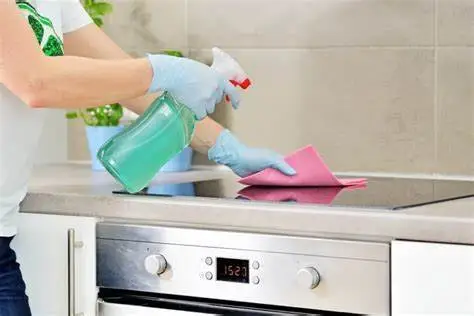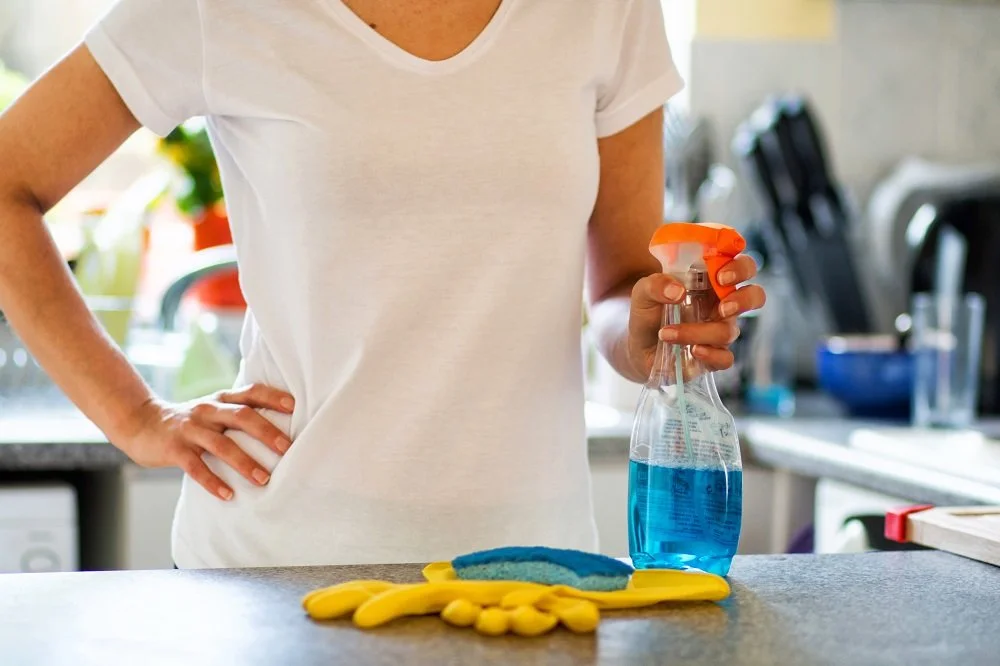Quartz countertops are celebrated not only for their aesthetic appeal and durability but also for their low-maintenance nature. However, in today’s world, it’s not enough to keep your kitchen surfaces looking clean—they also need to be disinfected properly. If you’re wondering how to disinfect quartz countertops without damaging their finish, this guide has you covered.
In this article, you’ll learn the most effective ways to safely disinfect quartz, which products are best, and what to avoid. Whether you’re dealing with everyday messes or trying to sanitize after food prep, disinfecting your quartz surfaces the right way preserves their longevity and shine.

Why Proper Disinfection Matters
Unlike porous natural stones, quartz countertops are engineered to be non-porous. This means bacteria and viruses don’t easily absorb into the surface—but that doesn’t mean quartz never needs disinfecting. Germs, oils, and food particles can linger on the surface after use, especially in high-traffic kitchens or bathrooms.
Just like you learned How to Clean White Quartz Countertops or What to Use to Clean Quartz Countertops, disinfection is an extra, essential layer of hygiene.

What You’ll Need to Disinfect Quartz Countertops
Disinfecting your quartz doesn’t require complicated tools. In fact, using the wrong products—such as bleach or vinegar—can damage the resin binders in quartz. Instead, stick to these:
- A soft microfiber cloth
- Warm water and mild dish soap
- 70% isopropyl alcohol
- Spray bottle
- Optional: A disinfecting product labeled safe for quartz
Step-by-Step: How to Disinfect Quartz Countertops
1. Wipe Down First
Before you disinfect, always clean the surface using warm water and dish soap. This removes dirt and debris so the disinfectant can work directly on the surface.
2. Apply Isopropyl Alcohol
Fill a spray bottle with a 1:1 mix of 70% isopropyl alcohol and water. Spray a fine mist across the surface.
3. Let It Sit
Let the alcohol solution sit on the surface for at least 60 seconds. This ensures effective killing of bacteria and viruses.
4. Wipe Clean
Wipe the area with a clean, dry microfiber cloth. This eliminates leftover moisture and ensures no residue remains.
5. Repeat as Needed
Disinfect regularly after food prep or use—especially when preparing raw meat or hosting guests.
What to Avoid When Disinfecting Quartz Countertops
Some household disinfectants are too harsh for quartz. Here are things to never use:
- Bleach or chlorine-based sprays
- Ammonia or vinegar
- Abrasive pads or scrubbers
- High-heat steam cleaners
- Disinfecting wipes with acidic ingredients
These can strip the finish and cause permanent dullness or etching. Curious about how quartz compares to other surfaces? See how it fares in the quartz countertops vs granite or quartz countertops vs marble debate.
Best Disinfectants for Quartz Countertops
- Isopropyl Alcohol: Best DIY solution, effective and safe.
- Lysol Daily Cleanser: Alcohol-based and quartz-safe.
- StoneTech Disinfecting Wipes: Specifically formulated for engineered stone.
Always check the manufacturer’s recommendations and test in a small area first.
Quartz Countertops Cost and Why Disinfection Helps Preserve Value
On average, quartz countertops prices range from $50 to $150 per square foot installed. Higher-end quartz countertops brands like Caesarstone or Cambria might cost more. Proper care, including disinfection, protects your investment and keeps your surfaces in showroom condition.
Interested in exploring installation? Check out:
Tips for Long-Term Quartz Countertop Maintenance
- Daily Cleaning: Mild dish soap + warm water
- Weekly Disinfection: Use alcohol solution or quartz-safe cleaner
- Monthly Inspection: Check for stains, chips, or unusual wear
- Use Coasters & Cutting Boards: Prevent direct exposure to heat or knives
- Keep Away from Harsh Chemicals: Especially near sinks and stove areas
When to Disinfect Quartz Countertops
Knowing when to disinfect is just as important as how. Here are the most common times:
- After preparing raw meat, fish, or eggs
- When someone is sick in the household
- After receiving groceries or packages
- Before and after a party or large gathering
- During allergy or flu season
FAQs About Disinfecting Quartz Countertops
Can I use Clorox wipes on quartz countertops?
Only if they’re bleach-free and labeled safe for quartz. Always wipe with water afterward.
Is vinegar safe for disinfecting quartz?
No. Vinegar is acidic and can damage the resin binder in quartz countertops.
Do quartz countertops need to be sealed?
No. Quartz is non-porous and doesn’t require sealing like granite or marble.
Final Thoughts
Learning how to disinfect quartz countertops the right way ensures your surfaces remain both beautiful and sanitary. By using gentle but effective solutions like isopropyl alcohol, avoiding harsh chemicals, and maintaining a regular cleaning routine, you can keep your countertops germ-free without compromising quality.
Quartz is an investment in your home. Treat it with the care it deserves and it will reward you with years of functionality and shine.

